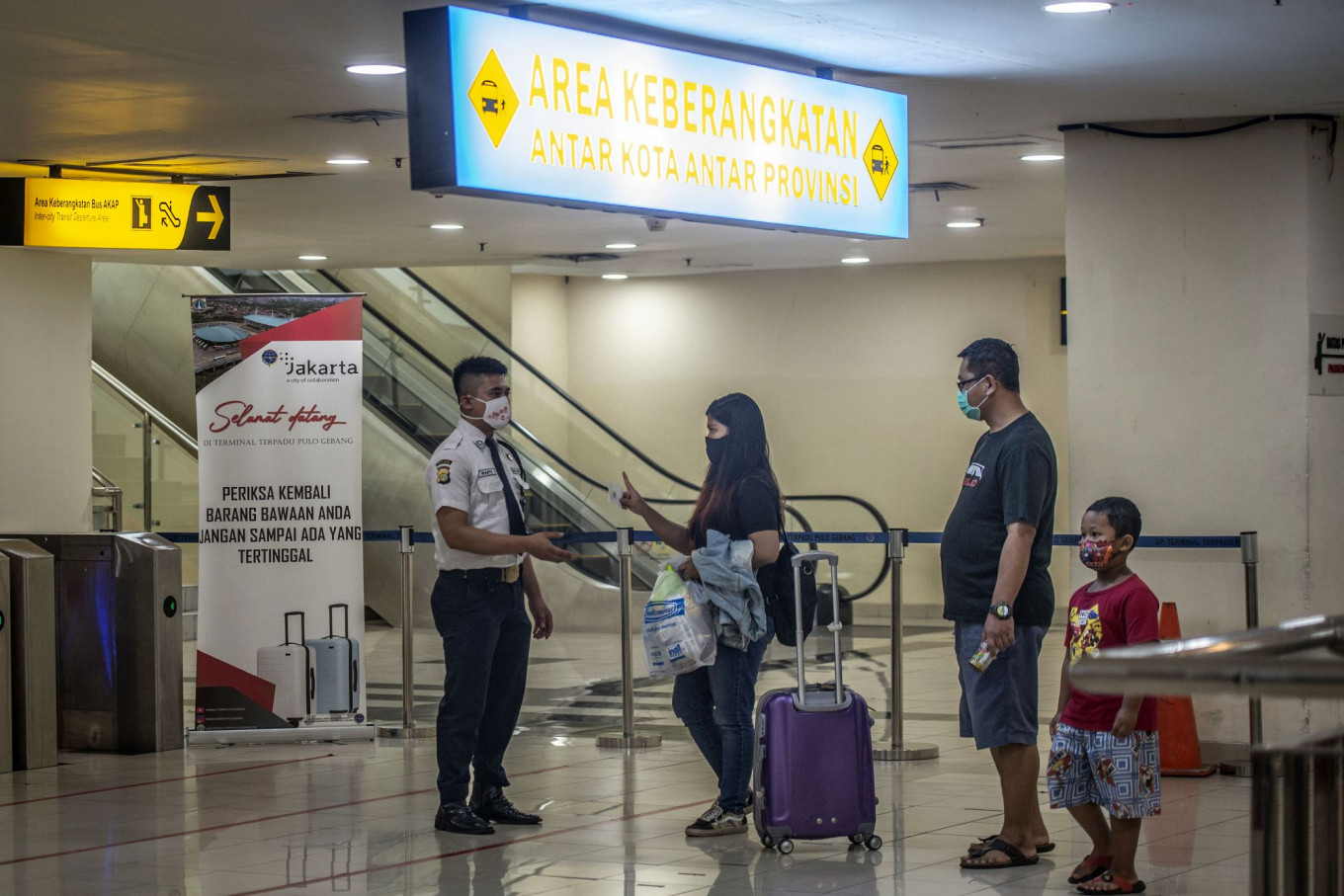Popular Reads
Top Results
Can't find what you're looking for?
View all search resultsPopular Reads
Top Results
Can't find what you're looking for?
View all search resultsCOVID-19 antigen test price cap set at Rp 250,000 in Java
The price ceiling was determined on Friday based on an analysis by the Development Finance Comptroller (BPKP) and the Health Ministry, as concerns grow over providers charging "varying prices" for a test, BPKP defense and security director Faisal told a virtual press briefing.
Change text size
Gift Premium Articles
to Anyone
T
he government has set the price ceiling for individually requested COVID-19 antigen tests at Rp 250,000 (US$17.73) in Java and Rp 275,000 outside Java amid plans to require travelers to have negative antigen test results.
The price ceiling was determined on Friday based on an analysis by the Development Finance Comptroller (BPKP) and the Health Ministry, as concerns grow over providers charging "varying prices" for a test, BPKP defense and security director Faisal told a virtual press briefing.
The government is forming a regulation on negative antigen test results as a requirement for travelers ahead of the Christmas and New Year holidays in order to suppress COVID-19 transmission.
Coordinating Maritime Affairs and Investment Minister Luhut Binsar Pandjaitan said on Dec. 14 that while travelers flying to Bali must take the “gold-standard” polymerase chain reaction (PCR) test, vacationers traveling by land must present negative antigen test results taken two days prior to their trip. The next day, he said the same antigen test requirement would also apply to travelers going to other regions both by plane and long-distance train.
West Java Governor Ridwan Kamil has also issued a circular requiring tourists to show a negative antigen or PCR test result.
"Antigen [tests] provide more accurate results than rapid antibody tests. The policy is imposed to prevent COVID-19 transmission during the Christmas and New Year holidays," the Health Ministry's health service directorate general-secretary, Azhar Jaya, said in the briefing.
Read also: Use antigen tests for screening but with caution: Experts
Azhar said regional health agencies were expected to monitor health care facilities as they implement the price ceiling. The rate does not apply to healthcare facilities receiving assistance in the form of testing kits, reagents and personal protective equipment from the government, he said.
The price of antigen tests varies across the country, with some costing over Rp 400,000. Faisal added that the government and local administrations could provide subsidies to further accommodate lower-income people, and his agency and the Health Ministry would continuously evaluate the rate.
The government previously required domestic air, land and sea travelers to present negative PCR test results or non-reactive antibody test results that are valid for 14 days. Experts have heavily criticized the requirement as the tests are better at detecting past infections or a recovery phase rather than current infections, which is when there is a higher chance of the novel coronavirus to spread to others.
Many of those distributed in Indonesia were also found to have sensitivity and specificity rates lower than 50 percent, according to the Association of Indonesia's Clinical Pathology and Laboratory Medicine specialists (PDS PatKLIn). This means higher chances of false negatives and positives could be high with rapid antibody tests, the price ceiling of which has been set at Rp 150,000 by the government.
Experts have been calling on the government to use the rapid antigen tests, although with caution. Unlike PCR tests that may take hours or even days to process given the use of advanced equipment in labs, antigen tests can provide results within 30 minutes.
These tests use nasal or throat swab samples to detect certain proteins on the surface of the coronavirus and do not require advanced lab equipment. However, they are still less accurate than PCR tests.
Read also: Data discrepancy, testing credibility haunt Indonesia’s COVID-19 management
As opposed to antibody tests that detect antibodies in blood samples, which may only develop weeks after infection and can form differently in people with certain conditions, experts say antigen tests are best used to detect infections in pre-symptomatic and early symptomatic cases up to three days before symptom onset and five to seven days after the onset.
Experts also highlighted the need to purchase tests suggested by the World Health Organization and tests that were not on the list should be validated by the Health Ministry to ensure their quality — unlike the currently used rapid antibody test kits.
Studies of antigen test kits of various brands cited by the WHO have shown that their sensitivity ranges between 0 and 94 percent, meaning the chance of a false negative could be high. But their specificity is consistently above 97 percent, meaning the chance of a false positive is low. (ars)
Editor’s note: This article is part of a public campaign by the COVID-19 task force to raise people’s awareness about the pandemic.










